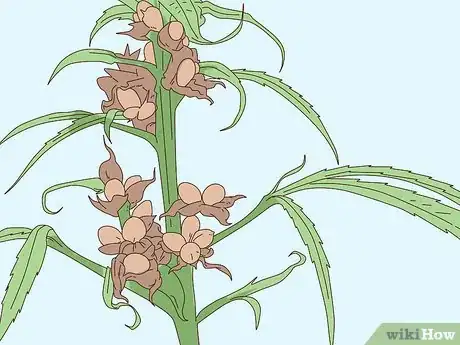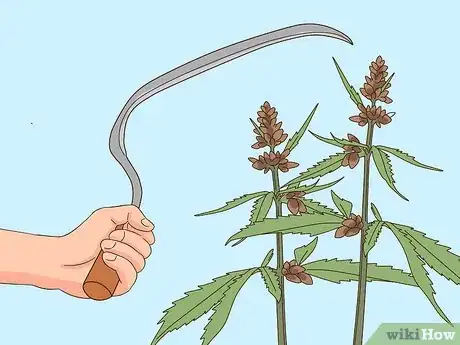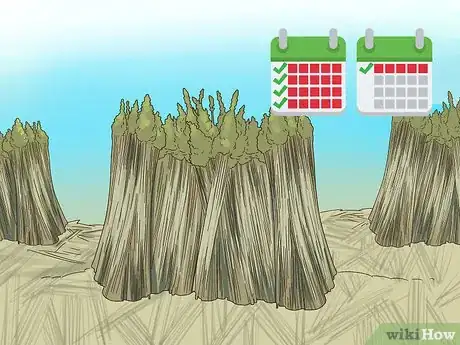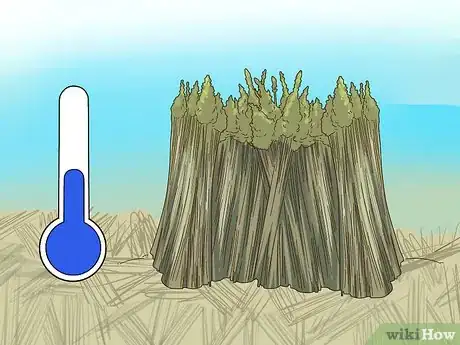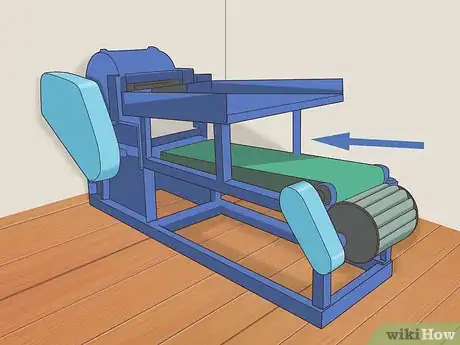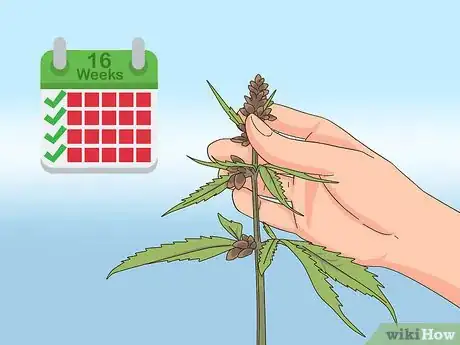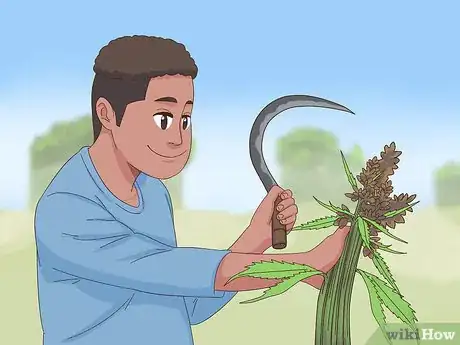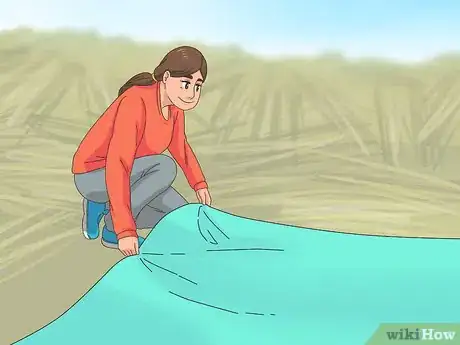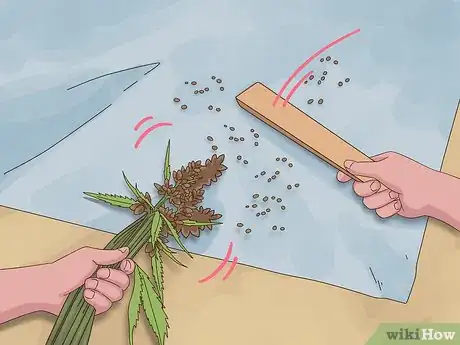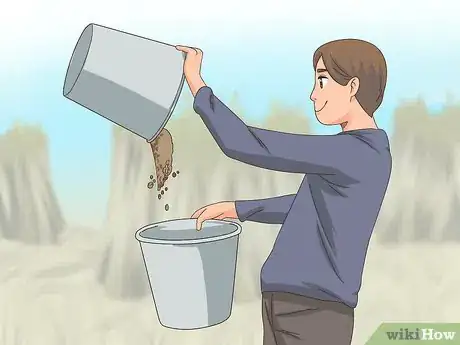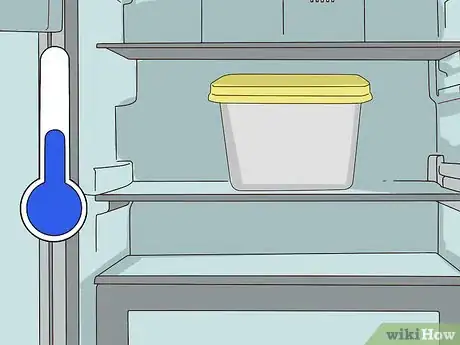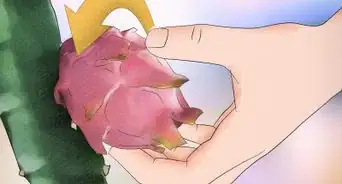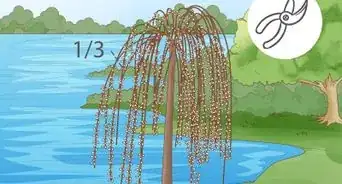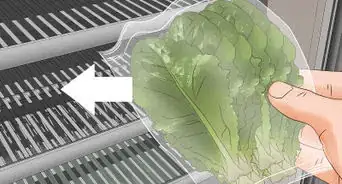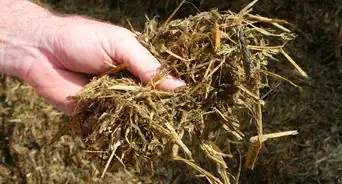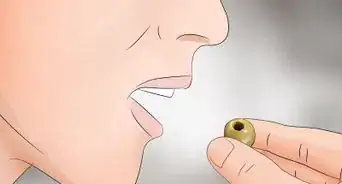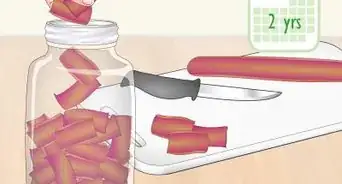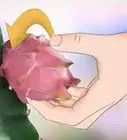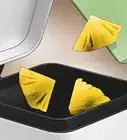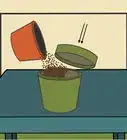This article was co-authored by Maggie Moran and by wikiHow staff writer, Hunter Rising. Maggie Moran is a Professional Gardener in Pennsylvania.
This article has been viewed 70,240 times.
Hemp is a versatile plant that can be harvested for plant fibers or for their nutritious seeds. Unfortunately, the fibers and seeds mature at different times throughout the season and cannot be harvested together in the same crop. Whichever product you plan on harvesting from hemp, just make sure growing it in your area is legal.
Steps
Harvesting the Fibers
-
1Begin harvesting the fibers as the seeds start to develop. Look for seeds starting to form on your plant in groupings near the leaves. Waiting too long into the growing season makes the fibers too coarse and male fibers die soon after the plants pollinate.[1]
- If you want stronger fibers, you can collect the coarse fibers from mature stalks.
- Hemp fibers and seeds mature at different times and are challenging to harvest at the same time. Make a decision on what product you’d prefer to harvest from your plants.
-
2Cut the stalks with a sickle or a sickle-bar mower. Make your cuts as close to the base of the plant as you can. If you have a small grouping of hemp, you can use a sickle to cut down the stalks individually. For larger crops, consider using a mower with a sickle-bar to make uniform cuts at the same height.[2]
- Sickles are curved blades commonly used for harvesting grains and tall stalks. They can be purchased at a gardening store.
- A sickle-bar is an attachment for a riding lawnmower or tractor with a row of blades to cut the stalks at the same height. Rent a sickle-bar from a specialty farm equipment store.
Advertisement -
3Leave the stalks in the field for 5 weeks. Lay the stalks in a pile on the ground and leave them to rot slightly. The rot on the outer layer of the stalk helps you separate the fibers later on. This process is known as retting and can take up to 5 weeks.[3]
- Moisture and microbes break down the chemical bonds that hold the stem together.
- Retting will not occur at temperatures below 41 °F (5 °C) or above 104 °F (40 °C).[4]
- Retting can also be done by submerging the stalks in water for 7 to 10 days.
-
4Dry the stalks in a cool, dry area until their moisture level is 15% or lower. Stand the stalks upright and keep them separated so they are able to dry out completely. Use a moisture meter to determine how much water is still present in your plant.[5]
- Moisture meters used to measure water levels in plants can be purchased online or at gardening stores.
-
5Break the stalks using a decorticator to separate the fibers. A decorticator is a machine with 2 gear-like rollers that help break off the dried pieces of the hemp stalk. Pass the dried stalks through the rollers of the machine 1 or 2 stalks at a time. The rollers will break apart the woody pieces of the stem and collect the fibers on the other side.[6]
- Decorticators are available to rent from farming equipment stores.
- Use caution when operating heavy machinery to avoid injury.
Collecting Hemp Seeds
-
1Start your harvest when your crop is 16 weeks old. Look for seeds that have not split open near flowers in full bloom. Feel the seed husks to see if they are hard to the touch. Most of the leaves from the stalk will have fallen off at this point in the season.[7]
- In the United States, harvest usually occurs in early October.
- Seeds on the same plant will mature at different times. While some of the lower seeds may be mature, seeds higher on the plant may not be ready yet. Watch your plant carefully to determine when to harvest your plant for maximum yield.
- Keep the fallen leaves on the soil to compost for next growing season.
-
2Reap the tops of the plants with a sickle during dry, sunny weather. Make your cuts below the lowest grouping of seeds. The seeds should resemble small marbles without any cracks. Hold the top of the stem with your hands and slice through it with your sickle just below the lowest seed husk.[8]
- For larger commercial crops, use a combine with a dual-beam cutter.
-
3Lay down a tarp in a well-ventilated area. Make sure the tarp lays flat on the ground. If you’re inside, keep a few windows open so there is a breeze and fresh air coming in. If you’re outside, lay the tarp down on the ground in an open area.[9]
- A clean bed sheet also works if you don’t have a tarp.
-
4Thresh the seeds onto the tarp with a stick or bat. Hold the end of the stem just below the lowest seed husk with your non-dominant hand and use your dominant hand to hit the stalk with a stick. The seeds will break off of the stem with each hit. Collect the fallen seeds in the tarp you’ve laid down until you’re finished.[10]
- Use a machine thresher for large crops.
-
5Winnow the seeds in 2 large buckets to remove any residue. Pour the seeds you’ve collected into a 5 US gal (19 L) bucket. Hold the bucket 1 foot (0.30 m) above another empty bucket and slowly dump the seeds into it. Any residue from the stem or seed husk will blow away as you pour the seeds. Repeat the process 6 to 10 times to remove all the residue.[11]
- Use an industrial winnower for commercial crops to save time and energy.
- Point a fan at the buckets if the area you’re working in has poor air flow.
-
6Store the seeds in a 32 to 40 °F (0 to 4 °C) area with low humidity. Pour the seeds into a container 10 inches (25 cm) deep and seal it with a lid. Store the seeds in a large fridge or cool area so they do not germinate in storage.[12]
- Hemp seeds in a dry storeroom will burst and become germ-infested.
- Seeds can be stored in sacks if they have a moisture level less than 12%.
Community Q&A
Did you know you can get answers researched by wikiHow Staff?
Unlock staff-researched answers by supporting wikiHow
-
QuestionIs hemp a drug?
 wikiHow Staff EditorThis answer was written by one of our trained team of researchers who validated it for accuracy and comprehensiveness.
wikiHow Staff EditorThis answer was written by one of our trained team of researchers who validated it for accuracy and comprehensiveness.
Staff Answer wikiHow Staff EditorStaff AnswerHemp is a type of cannabis plant, but it contains much lower concentrations of THC (the psychoactive component of marijuana) than the closely related marijuana plant. This means that if you were to smoke or ingest hemp, it wouldn’t give you the same kind of high as marijuana. However, it does contain high concentrations of CBD, another compound that is thought to have a variety of therapeutic benefits (such as relief of pain, nausea, and anxiety).
wikiHow Staff EditorStaff AnswerHemp is a type of cannabis plant, but it contains much lower concentrations of THC (the psychoactive component of marijuana) than the closely related marijuana plant. This means that if you were to smoke or ingest hemp, it wouldn’t give you the same kind of high as marijuana. However, it does contain high concentrations of CBD, another compound that is thought to have a variety of therapeutic benefits (such as relief of pain, nausea, and anxiety). -
QuestionWhat equipment does it take to harvest hemp?
 wikiHow Staff EditorThis answer was written by one of our trained team of researchers who validated it for accuracy and comprehensiveness.
wikiHow Staff EditorThis answer was written by one of our trained team of researchers who validated it for accuracy and comprehensiveness.
Staff Answer wikiHow Staff EditorStaff Answer
wikiHow Staff EditorStaff Answer -
QuestionCan you round bale hemp?
 wikiHow Staff EditorThis answer was written by one of our trained team of researchers who validated it for accuracy and comprehensiveness.
wikiHow Staff EditorThis answer was written by one of our trained team of researchers who validated it for accuracy and comprehensiveness.
Staff Answer wikiHow Staff EditorStaff Answer
wikiHow Staff EditorStaff Answer
Warnings
- Use caution when operating heavy machinery so you do not injure yourself.⧼thumbs_response⧽
- Growing hemp is illegal in some countries. Check your local laws before you start growing it.⧼thumbs_response⧽
Things You’ll Need
Harvesting the Fibers
- Sickle or sickle-bar mower
- Moisture meter
- Decorticator
Collecting Hemp Seeds
- Sickle
- Tarp or bed sheet
- Stick or bat
- 2 5 US gal (19 L) buckets
- Plastic container or sacks
References
- ↑ http://innvista.com/health/foods/hemp/harvesting-hemp/
- ↑ http://nationalhempassociation.org/hemp-harvesting/
- ↑ http://nationalhempassociation.org/hemp-harvesting/
- ↑ https://www.hempbasics.com/hhusb/hh3fiber.htm
- ↑ https://www.hempgazette.com/industrial-hemp/hemp-fiber-production/
- ↑ https://www.hempgazette.com/industrial-hemp/hemp-fiber-production/
- ↑ http://innvista.com/health/foods/hemp/harvesting-hemp/
- ↑ http://innvista.com/health/foods/hemp/harvesting-hemp/
- ↑ http://innvista.com/health/foods/hemp/harvesting-hemp/
About This Article
The best time to harvest hemp fibers is when seeds start developing on your plants. If you only have a few plants, use a sickle to cut the stalks. Try to cut as close to the base of the plant as you can. If you have large amounts of crops, use a mower with a sickle-bar attachment. Once you cut the stalks, pile them in a field and leave them for 5 weeks to rot slightly so their stems start to break down. After that, you’ll want to dry the stalks in a cool, dry area with a moisture level under 15 percent. To break down the stalks, you’ll need a decorticator, which is a machine that helps break off the dried hemp stalk. For more tips from our Gardening co-author, including how to harvest hemp seeds, read on!
